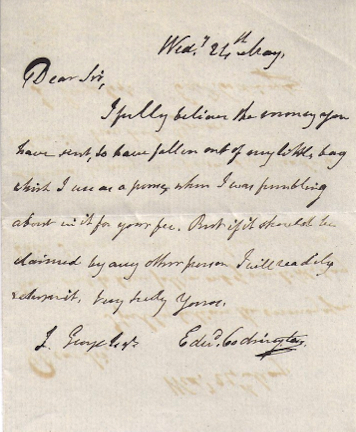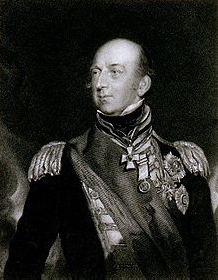The appointment letters of John Durancé George, Dental Surgeon
Writer: Sir Edward Codrington
Date: Wedy 24th May, 1848
Address:
Wedy 24th May
Dear Sir,
I fully believe the money you
have sent, to have fallen out of my little bag
which I use as a purse, when I was fumbling
about in it for your fee. But if it should be
claimed by any other person I will readily
settle for it,
Very truly Yours
Edw.d Codrington
J.George Esqe


Notes:
The youngest of three brothers born to an aristocratic, landowning family, Codrington entered the Royal Navy in 1783.
Having served off the Eastern Seaboard of the USA, in the Mediterranean and in home waters, he was promoted to lieutenant
in 1793 when Lord Howe selected him to be signal lieutenant on the flagship of the Channel fleet at the beginning of the
French Revolutionary Wars. He served on HMS Queen Charlotte during the battle of the Glorious First of June.
In 1794 he was promoted to commander, and in 1795 Post-Captain, with command of the 22-gun HMS Babet. His next command
was the frigate HMS Druid until she was paid off in 1797. Following this, Codrington spent a period largely on land and
on half-pay.
On the renewal of hostilities with France he remained in frigates for some time before, in 1805, being given HMS Orion,
part of Nelson’s fleet off Cadiz. Codrington and Orion were engaged at the Battle of Trafalgar on 21 October 1805,
where Orion was stationed to the rear of the northern division and therefore took two hours to reach battle. Once there,
Codrington ignored all other ships and focused entirely on closing with a hitherto unengaged French ship, the Swiftsure,
forcing her to surrender. He then attacked but failed to capture the Spanish flagship Principe de Asturias before moving
on to the Intrepide. Orion, with other ships, dismasted and then sailed round her firing continually until she surrendered.
For several years, Codrington fought alongside the Spanish against the French in the Mediterranean, commanding a squadron
which harried French shipping and made numerous coastal raids. He also supported the disastrous Walcheren expedition in 1809.
In 1814 he was promoted to Rear Admiral, and made Vice Admiral in 1821.
In December 1826 Codrington was appointed once again to the Mediterranean command. From that date until his recall in the
June 1828 he was engaged in the arduous duties imposed on him by the Greek War of Independence, which had led to anarchy in
Greece and surrounding areas. His orders were to enforce a peaceful solution on the situation in Greece, but he was never
known for his diplomacy and, on 20 October 1827, he destroyed the Turkish and Egyptian fleet at the Battle of Navarino
while in command of a combined British, French and Russian fleet.
Codrington was key to the 1828 Treaty of Alexandria which led to the evacuation of Ottoman forces from the Peloponnese.
Back at home Codrington spent some time in defending himself from charges of heavy-handedness. He commanded a training
squadron in the Channel in 1831 and became a full admiral in 1837. He was elected MP for Devonport in 1832, and sat until
he resigned in 1839. From November 1839 to December 1842 he was CinC Portsmouth.
Codrington died in London in April 1851.


